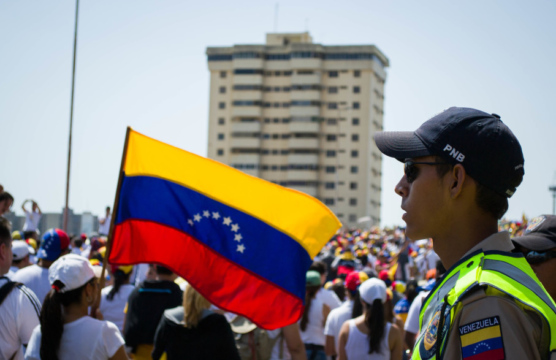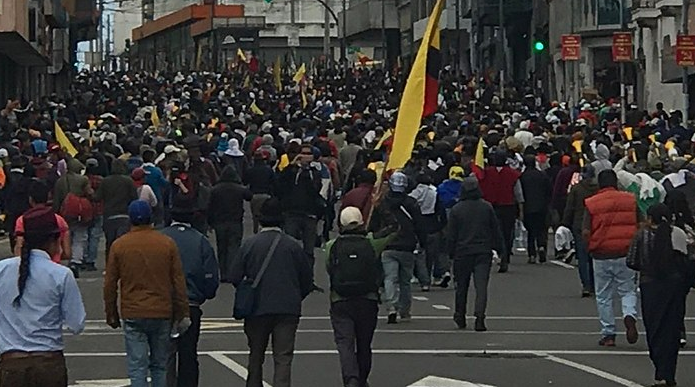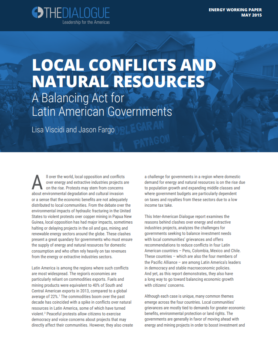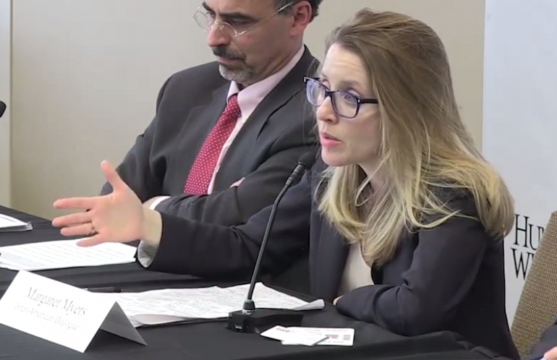
Venezuela Needs Its Neighbors
Events in the Ukraine have lifted the morale of anti-government protestors in Venezuela and elevated their expectations.
A Daily Publication of The Dialogue
Over the past month, massive and often unforeseen protests have exploded across Latin America and the Caribbean, with riots in Ecuador, Haiti, Chile and Bolivia making headlines for weeks. Are there common trends that can be identified among the different protests sweeping the region, or is each more specific to the country’s own circumstances? Are demonstrations likely to spill over or inspire unrest in other countries? What consequences do the protests have for policymaking in the near term, and what legacy will they have beyond this year, especially in terms of how governments respond to social demands in the future? Will more populism in the region be the result?
Michael Reid, “Bello” columnist and senior editor for Latin America and Spain at The Economist: “There are some obvious differences: the protests in Bolivia are about alleged electoral fraud, and Haiti bears little resemblance to South America. But there are some common elements in Chile, Ecuador and other situations in the region (such as the massive protests that seemingly exploded out of nothing in Brazil in 2013). The main factor has been the sense of frustrated expectation among expanded middle classes. In some countries, that is because the economy has stagnated for years; in Chile there is a widespread perception that the system is rigged in favor of a small business and political elite. Second, corruption and poor public services have served to discredit the region’s politicians. Third, there is a copycat factor: social media amplifies protests elsewhere. That means it is possible that such protests will break out elsewhere. They certainly make life harder for policymakers. Who will dare raise transport or utility tariffs? One lesson from Ecuador is that governments should prepare the ground for tariff hikes by, for example, increasing payments in conditional cash-transfer schemes for the poor. In Chile, there is a risk of populism, either of the left or right. To prevent that, it is urgent is to rebuild channels of communication between politicians and a more demanding population. Given the weakness and fragmentation of political parties, that is easier said than done.”
Ivan Briscoe, program director for Latin America and the Caribbean at International Crisis Group: “Latin America’s wave of public unrest has swept across countries regardless of whether they are poor or relatively rich, governed by left or right, democratic or authoritarian. Though the differences between each protest are clear, so are the common denominators. Anemic regional economies mean the middle classes, estimated to have grown 50 million in the boom years until 2012, struggle to hold on to precarious livelihoods; in Chile, Ecuador, Honduras and Haiti, the causes of recent protests were brooding socioeconomic anguish, made worse by extreme inequality and mainly triggered by abrupt price rises. Anti-government fury in turn draws on a deep well of public mistrust toward political leaders, state institutions and business elites. Authoritarian governments, such as in Venezuela, Nicaragua and arguably Bolivia, stoke democrats’ indignation through repression—democratic governments employ less violence, concede to protesters’ demands more easily, but in critics’ eyes are overrun by unaccountable interest groups and prone to bogus promises. The spread of these protests will depend upon the winds of economic adversity and the intangibles of the public mood. Hard-fought elections in Argentina, now suffering one of the region’s larger contractions, appear to cushion public ire there for now. In contrast, Venezuela’s unresolved turmoil multiplies tensions: its secret agents sowing destabilization may be colorful fantasies, but its crisis shapes and inflames the ways in which political enemies are defined and treated across the region. A negotiated settlement to Venezuela’s crisis would do much to dampen Latin America’s febrile and polarized politics. But only fairer societies offering greater mobility and better public services would address the roots of many of the protests; they are still a way off.”
Pablo Pryluka, doctoral candidate in the Department of History at Princeton University: “It is hard to find a common explanation for the social unrest that has been shaking Latin America. Each case looks different. In Ecuador, Lenín Moreno took office coming from a left-center tradition but ended up applying austerity measures. In Bolivia, after more than a decade of growth and poverty reduction, the upheaval comes from the province of Santa Cruz, traditionally against Morales. The demonstrations there were smaller and did not recognize the result of the election. In Chile, persistent economic growth has not been able to solve inequality, and those who have not enjoyed the benefits of the ‘Chilean miracle’ are claiming their share of the cake. Haiti, especially after the 2010 earthquake and the military occupation of MINUSTAH, had been suffering from a political crisis that does not seem to have a solution in the foreseeable future. Despite their differences, South American countries seem to share something: increasing frustration with their economic performance and impatience with their political elites. Although it doesn’t seem likely that the protests will spill over to other countries any time soon, it depends on how effectively these social demands can be contained institutionally. Policymakers face a challenge, dealing with demands from three social groups: those excluded from welfarism and suffering material deprivation; those who improved their living conditions in the last 15 years but are looking for more; and those who feel that their institutional regimes are not legitimate. If the international economic context does not help, the region might experience more social unrest in the upcoming year.”
The Latin America Advisor features Q&A from leaders in politics, economics, and finance every business day. It is available to members of the Dialogue's Corporate Program and others by subscription.
Events in the Ukraine have lifted the morale of anti-government protestors in Venezuela and elevated their expectations.
Conflicts over energy and natural resources are leading to social turmoil and posing serious challenges for investment projects all over Latin America.
How will increasing Asian investment in Latin America influence economics and politics in the region?
 In recent weeks, citizens have taken to the streets in several countries in Latin America and the Caribbean. A protest last month in Ecuador is pictured above. // Photo: Voice of America.
In recent weeks, citizens have taken to the streets in several countries in Latin America and the Caribbean. A protest last month in Ecuador is pictured above. // Photo: Voice of America.

 Video
Video